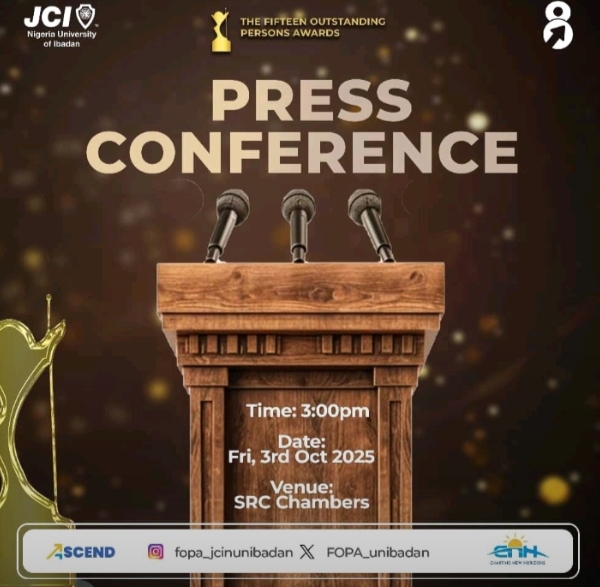Editorial: The Fate of University of Ibadan Students in the Hands of Intellectual Unionists

The previous week, AFAS Press published an editorial detailing the events of the misdeeds of the Erstwhile Students’ Union President, Aweda, regarding his mischievousness towards calling students Congress, while also serving as a cursory message to Odedele Covenant, the incumbent SU President, as regarding the May 17th Congress. It is often said that history may not necessarily repeat itself in the same manner, but may manifest in a different form. Mark Twain’s “ History doesn’t repeat itself, but it rhymes,” captures this idea well. Looking at the circumstances trailing the call and execution of recent UI students’ Congresses, one might notice a similar pattern, but some obvious differences. Unfortunately, not positive differences.
Odedele Covenant’s Version
After much anticipation from the student community, the executives, on Thursday, eventually dropped a memo that sent the student community into an unexpected shock and disbelief. The UI’SU released a memo that the congress has been cancelled, citing security reasons and personal safety as primary reasons. What was described as “a security threat” were three identified students —two honourables and a student — among others, who confronted executives (President, General Secretary, and the PRO) to demand clarification on what’s delaying the call for congress. As inferred from the situation, when no solid answers were forthcoming, they reportedly went ahead to obstruct the executives from leaving the venue until answers were given. Interestingly, after unilaterally cancelling the congress, the Union executives wrote to the SRC requesting suspension of the already-cancelled congress. A move that was not only bereft of logic but also blatantly undermining the authority of the SRC. Another reason cited for cancelling the Congress was the clash that erupted between Nnamdi Azikiwe Hall and Mellanby Hall following the completion of the Freshers’ Football cup, which does not in anyway affects the Congress slated for the following day
As expected, the SRC, in a swift-emergency meeting, upheld the congress to hold as earlier ratified with some resolutions: (I) The executive council must put out a memo 30 minutes after the approval of the motion to bring awareness to the congress on Saturday,(II) The SRC will provide security for the president through the Defence Ministers of various halls of residence and as establishing a five-man security committee from the SRC honourables. However, what initially seemed like a soon-to-start congress on Saturday was abruptly and unilaterally suspended by the Covenant Odedele-led executive council on the basis of an incomplete quorum. A move that has since been criticised by many within and beyond the student community as irrational and constitutional
The Breach of the UI’SU Constitution and The Disregard for UItes.
The previous week witnessed a series of breaches of the University of Ibadan students’ Union constitution by the SU president and by extension, the executive council— ironically, individuals supposed to be the custodians and defenders of the Constitution. A closer look into the constitution, Article XIII, section 3. (Congress shall also be summoned by a resolution of Council) grants the Students’ Representatives Council to call for a Congress after a resolution which was done on Saturday May 10 at the SRC plenary session. Also, Article XXV, section 3(a) states that the Council shall have the power to summon a general meeting of the Union by a resolution passed by two thirds of members voting at an ordinary meeting) and this further grants the Council(SRC) the power to convey a congress with the approval of two thirds members vote. Thus, the decision to call off the congress on Thursday constitutes a breach to Article XIII Section 3 & Article XXV, Section 3(a) of the UI’SU Constitution. This move has been described by many as unconstitutional, blatantly undermining the authority of the Council and a misrepresentation of the interest of the University of Ibadan Students.
In a further show of disregard, Covenant had earlier been directed to issue the Congress notice thirty minutes after the resolution was made as aforementioned. This he didn’t do until after 8:00 am on the morning of the Congress, while even sending it out informally via Whatsapp until he was later corrected and instructed to use the official Union Letterhead. Worst still, neither he nor his council executives made noticeable attempts to mobilise students to come for the congress.An average Uite who has spent more than an academic session on campus knows that it takes conscious and deliberate efforts to mobilise students for an event like the Congress—unless, of course, it’s giving Fola/ Ayra Starr Marvin Records vibes. And the reasons are not far-fetched, a rooted distrust between the Union executives and the student body, especially in how issues affecting students are tackled, cannot be excluded. So it is surprising, even disappointing, to see that neither the executive nor the legislative council made any real effort to mobilise and sensitize students for the congress. Now that Odedele Covenant has unilaterally suspended the Congress twice, the question is: is he really for the students or is he serving another interest entirely.
Deadline Looming: What is the stance of the Union executives?
With just 14 days left until the official deadline for the payment of school fee, it has become necessary to question the stance of the Union executives on this pressing issue. Year after year, students have now been submerged into what is known as a yearly increment of some basic fees without any clear justification or communication from the management. Hopes that the school fees would decrease in some departments were met with subtle increments. This fee regime has cornered some students into applying for the “interest-free NELFUND loan,” forced some into dropping, driven people especially women to meet up with economic realities, while some had to repeat classes due to late payments. Such pressing issues must not be handled with levity
So far, the disposition of the Union executives towards appropriately representing the student community in issues such as this is not inspiring, and it doesn’t seem to reflect the “intellectual unionism” we lay claim to. The domino effect of this lackluster attitude would be more students opting for the loan, increased financial constraints on less-privileged students, more dropouts, repeated classes, and more academic disruption for those juggling part-time jobs to stay afloat. If truly Odedele Covenant claims to be the visionary he is, mobilising students to attend the congress where pressing issues would be discussed should have been a priority.
When questioned by honourables in the House about the delay in calling for the congress, he cited Senate regulations where he claimed the approval from the Dean of Students was required before a congress could be held. However, a close review of the UI’SU Constitution and its reference to Senate regulations shows no explicit provision where an approval from the management is needed to convey a student Congress. One may wonder if students have been deliberately kept in the dark about some certain university protocols or if this only exists in the imagination of the president. Perhaps, at this point, a copy of the Senate regulations should be made available for members to keep us informed and to guide our future moves. While the president, upon suspension of the congress, promised to call for another, yet, nearly a week after and about two weeks to deadline, the students have received no notice of congress from the executive council
UI’SRC: Friend or Foe?
While it is commendable that the University of Ibadan Students Representative Council made a call for a swift emergency meeting after the executive singlehandedly suspended the congress on Thursday, the SRC itself cannot be absolved of blame for the eventual failure of the Congress on Saturday. It is not enough to issue a resolution for congress while waiting passively for the executive to go ahead to mobilise. The responsibility to rally students lies on both arms of the union, being the representatives of all UI students.
Having had its resolutions dismissed twice by the executive council, the SRC must take decisive actions to uphold its authority. While necessary disciplinary measures should be apportioned to avoid setting a bad precedent, the students/honourables allegedly involved in the security-threatening case must be given fair hearing and protected from politically motivated narratives. Now, the Council must evolve from its familiar role as a budget-cutting and approval body. The Council must live up to its responsibilities as stipulated in the constitution.
We are at a point where we need to remind ourselves that the fight against school fee increment is real and the consequences of letting the fees stay must not be underplayed. Similarly, while the Speaker, upon suspension of the congress, promised to call for another one within a week, yet nearly a week after and about two weeks until deadline, the students are yet to get a resolution from the Council.
Council of Hall Chairpersons and Faculty Presidents: Where are we now?
An average UIte might not even be aware that the Council of Hall Chairpersons (COHC) and the Council of Faculty Presidents (COFP) exist until the recent basic due review saga. The COHC was the first to request for a #2000 upward review, citing “rising maintenance cost, improved hall services, and the need to enhance the overall welfare of students in their respective halls.” The COFP soon followed suit. But now, after receiving a #1,000 upward review, it seems they’ve retreated back to their shells.
At this point, one is left to wonder if they’re truly representing the students or mere lobbyists for institutional convenience. The silence in the face of the executive council’s abrupt cancellation of the congress speaks volumes. No statement nor visible mobilisation? This further begs a deeper question: Can the same set of students who demanded for an increment be relied upon to demand a reduction in hiked fees. Realistically, it seems doubtful. Nevertheless, both councils must be prepared to represent the students beyond the usual annual dues and souvenirs distribution. Or what would be the end of the reports you submitted to the SU executive council?
NELLFUND: An Alleged Saviour in Distress.
On Wednesday, May 21, the NELFUND officials visited the University of Ibadan for an interactive session where it was revealed that the loan requests of 4,809 UI students for this session have been approved and will be disturbed within the next two weeks, while the portal for school fee payment closes June 6. With no hopes of reduction and no evidence of agitation from the intellectual union leaders who claim to represent the students’ interests. The reality becomes clear: the students are, once again, left with little to no choice than to opt for the NELFUND loan. The loan, for any, only adds to their pile of debts in an economy plagued with hyperinflation, persistent devaluing of naira and no hope of gainful employment after graduation.
Crossroad: What is the Way Forward?
The fact that the NELFUND loan scheme exists is, in itself, a testament to the unaffordability of the recently introduced school fees. As such, the government and other relevant stakeholders must implement the necessary measures to make education affordable and accessible to an average Nigerian student. If left unchecked, education would eventually become a luxury where only the privileged would afford it while students from less advantaged backgrounds are left wrecking debts or completely left out from acquiring formal education. The government must desist from hiding behind the tired excuse of “no funds” and must prioritise adequate funding for education. A budgetary allocation of less than 10% is insufficient to accommodate the demands of each varsities Therefore, the Students’ Union executives, SRC, COHC, COFP, Association of University Christian Students Fellowship (AUCSF), Muslim Students Society of Nigeria (MSSN) and the students themselves must unite to resist the anti-student policies being plastered on our faces. At every level, the interest of the students must be adequately represented by respective stakeholders and the right to education must be protected because it’s non-negotiable.








